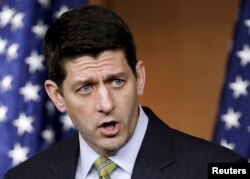The presumptive U.S. Republican presidential nominee, Donald Trump, is beginning to tap key advisers for a move to the White House, should he win the November national election.
The billionaire real estate mogul on Monday named New Jersey Governor Chris Christie, one of the Republican presidential challengers Trump defeated in his months-long campaign for the nomination, to serve as chairman of his transition team if he wins the election as the successor to President Barack Obama.
Christie, like Trump an outspoken public figure, dropped out of the presidential race in February, after finishing sixth in the party primary in the northeastern state of New Hampshire that Trump won. Christie subsequently endorsed Trump's bid for the Republican nomination and has appeared numerous times at his campaign rallies.
Some U.S. political analysts have mentioned the 53-year-old Christie, a one-time federal prosecutor, as a prominent possibility to join Trump on the Republican ticket as his vice presidential running mate, although Trump has not publicly mentioned whom he is considering.
Trump, a one-time television reality show host who has never held elective office, has also named his son-in-law, Jared Kushner, publisher of The New York Observer weekly newspaper and head of a real estate development company, to map out White House transition plans.
With Trump a political novice, little is known about whom he might name to key positions if he wins.
Some prominent Republicans, including the party's last two White House occupants, President George H.W. Bush and his son, President George W. Bush, have declined to endorse him. The party's top current elected official, House of Representatives Speaker Paul Ryan, says he is "just not ready" to support Trump yet.
Trump has won wide support from Republican voters in the state-by-state nominating contests for his call to deport 11 million illegal immigrants living in the United States, a vow to build a wall along the Mexican border to keep out more migrants, and a proposal to temporarily stop Muslims from entering the U.S.
But Ryan and other Republican leaders have been slow to acclaim Trump as the party's presidential nominee because of his anti-immigration stands, his characterization of Mexican migrants as rapists and drug abusers, and his denigrating comments about some women.
Ryan says he will not support Trump until he changes his sometimes harsh campaign rhetoric and adheres to traditional conservative Republican policies. He is slated to be the chairman of the party's July national nominating convention, but said Monday he would vacate the position if Trump, as the party's nominee, wants him to.
The two men are set to meet Thursday in Washington to air their differences, but Trump says it is possible the two may just "go our separate ways."
Numerous U.S. polls show Trump trailing the likely Democratic nominee, former U.S. Secretary of State Hillary Clinton, who is seeking to become the first female U.S. president.
Clinton has yet to clinch the Democratic presidential nomination, but holds a significant lead over her sole challenger, Vermont Senator Bernie Sanders.





